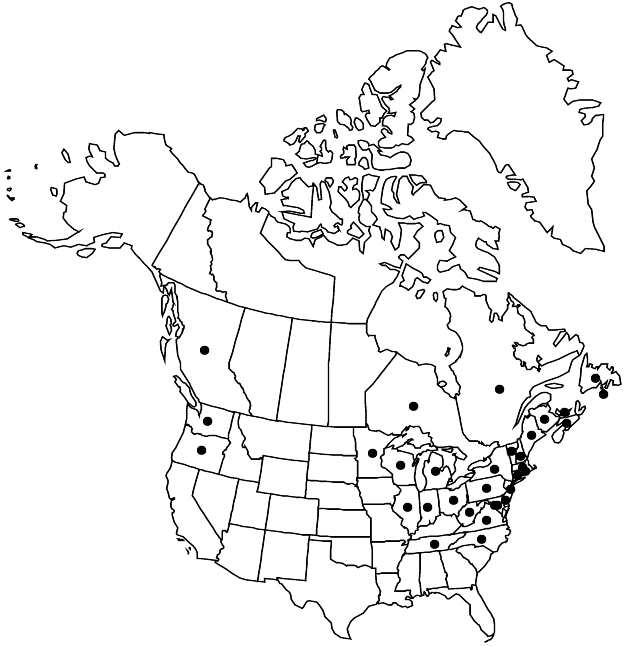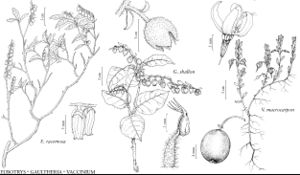Difference between revisions of "Vaccinium macrocarpon"
Hort. Kew. 2: 13, plate 7. 1789,.
FNA>Volume Importer |
FNA>Volume Importer |
||
| Line 26: | Line 26: | ||
|elevation=0-1400 m | |elevation=0-1400 m | ||
|distribution=St. Pierre and Miquelon;B.C.;N.B.;Nfld. and Labr. (Nfld.);N.S.;Ont.;P.E.I.;Que.;Conn.;Del.;D.C.;Ill.;Ind.;Maine;Md.;Mass.;Mich.;Minn.;N.H.;N.J.;N.Y.;N.C.;Ohio;Oreg.;Pa.;R.I.;Tenn.;Vt.;Va.;Wash.;W.Va.;Wis.;introduced in Europe. | |distribution=St. Pierre and Miquelon;B.C.;N.B.;Nfld. and Labr. (Nfld.);N.S.;Ont.;P.E.I.;Que.;Conn.;Del.;D.C.;Ill.;Ind.;Maine;Md.;Mass.;Mich.;Minn.;N.H.;N.J.;N.Y.;N.C.;Ohio;Oreg.;Pa.;R.I.;Tenn.;Vt.;Va.;Wash.;W.Va.;Wis.;introduced in Europe. | ||
| − | |discussion=<p>Vaccinium macrocarpon is introduced and escaping elsewhere (British Columbia, Oregon, Washington) with respect to its normal range in eastern North America.</p> | + | |discussion=<p><i>Vaccinium macrocarpon</i> is introduced and escaping elsewhere (British Columbia, Oregon, Washington) with respect to its normal range in eastern North America.</p> |
|tables= | |tables= | ||
|references={{Treatment/Reference | |references={{Treatment/Reference | ||
| Line 59: | Line 59: | ||
|publication year= | |publication year= | ||
|special status= | |special status= | ||
| − | |source xml=https://jpend@bitbucket.org/aafc-mbb/fna-data-curation.git/src/ | + | |source xml=https://jpend@bitbucket.org/aafc-mbb/fna-data-curation.git/src/8f726806613d60c220dc4493de13607dd3150896/coarse_grained_fna_xml/V8/V8_1010.xml |
|subfamily=Ericaceae subfam. Vaccinioideae | |subfamily=Ericaceae subfam. Vaccinioideae | ||
|genus=Vaccinium | |genus=Vaccinium | ||
Revision as of 18:04, 18 September 2019
Plants often ascending, shoots 0.4–1.5 dm. Leaf blades glaucous abaxially, green adaxially, usually narrowly elliptic to elliptic, rarely oblong, 5–18 × 2–55 mm, margins entire, slightly revolute. Inflorescences in axils of leaflike bracts at base of current year’s shoots. Pedicels nodding, slender, 2–3 cm, bracteolate; bracteoles 2, greenish white, scalelike, 1–2 mm wide. Flowers: calyx lobes relatively small; corolla strongly reflexed at anthesis, white to pink; filaments hairy; anther tubules 1–2 mm. Berries red to pink, 9–14 mm diam., smooth. 2n = 24.
Phenology: Flowering late spring–early summer.
Habitat: Bogs, swamps, mires, wet shores and headlands
Elevation: 0-1400 m
Distribution

St. Pierre and Miquelon, B.C., N.B., Nfld. and Labr. (Nfld.), N.S., Ont., P.E.I., Que., Conn., Del., D.C., Ill., Ind., Maine, Md., Mass., Mich., Minn., N.H., N.J., N.Y., N.C., Ohio, Oreg., Pa., R.I., Tenn., Vt., Va., Wash., W.Va., Wis., introduced in Europe.
Discussion
Vaccinium macrocarpon is introduced and escaping elsewhere (British Columbia, Oregon, Washington) with respect to its normal range in eastern North America.
